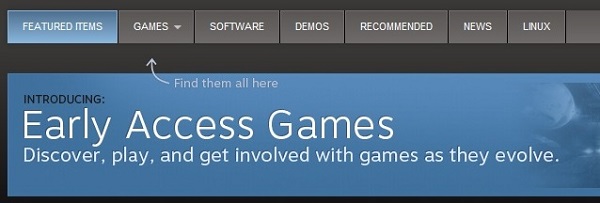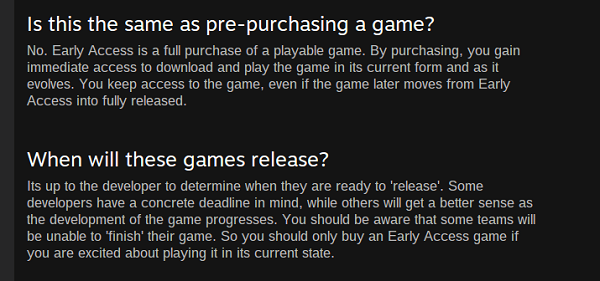Valve has released an update to its Steam Early Access FAQ warning consumers that games included in the Early Access program may never see a ‘final’ release. As initially spotted by VentureBeat, an update to the wording in the FAQ now reads the following:
“You should be aware that some teams will be unable to ‘finish’ their game. So (sic) you should only buy an Early Access game if you are excited about playing it in its current state.”
…Okay then.
 This is clearly a response to the recent double-whammy of the removal of Earth: Year 2066 from Steam’s storefront amid claims of false marketing, followed by the abandonment of the long-in-development city management game Towns. The close proximity of these two situations served to release a lot of pent-up misgivings about Early Access as a retail model, with many looking to Steam for a policy-based response. Their answer will not be the one that many were looking for.
This is clearly a response to the recent double-whammy of the removal of Earth: Year 2066 from Steam’s storefront amid claims of false marketing, followed by the abandonment of the long-in-development city management game Towns. The close proximity of these two situations served to release a lot of pent-up misgivings about Early Access as a retail model, with many looking to Steam for a policy-based response. Their answer will not be the one that many were looking for.
Early Access has been a huge success for Steam, and to be fair it has brought into existence a lot of games; games that are eminently playable even in ‘unfinished’ form, and which may not have gotten to see the light of day at all if it weren’t for the program. By the same token, there are a lot of developers who are taking the show of faith represented by an Early Access purchase very seriously, with regular updates and additions to their games genuinely allowing fans to see their games develop as the concept suggests.
And then you have your Earth: Year 2066s . Your Townss. Those games that, be it through laziness, lack of resources or practical SNAFUs, never reach the level of polish to make them satisfying to play, let alone ready for full release. Now it is true that sometimes people’s attitudes towards crowdfunding gets a wee bit unrealistic, but if you sell someone an alpha or beta of a game under a scheme that implies a finished release version in its very name, isn’t it fair for consumers to expect exactly that? What Valve advises is, in principle, a sensible approach to buying Early Access or crowdfunded games. You should only buy games that you think will provide you a satisfactory experience now rather than counting on what it’ll be like when/if it’s finally completed, and it’s easy to research games to get an idea of whether they’re worth the money at this point (Our new regular column, MCP U/C, has been set up for that exact purpose).
But at the same time, isn’t it also fair that games set up for Early Access under Steam’s wing should inspire a bit more confidence? Otherwise, what’s the point of Steam having an Early Access program? The exact role of Valve in this process has always been hazy, and a response given to VentureBeat by Director of Marketing Doug Lombardi doesn’t really help matters:
“The changes to the FAQ are intended to help set consumer expectations of what may or may not happen over the course of development of an Early Access game. we frequently iterate on Steam features as we gather feedback and find areas for improvement.
In this case, it became apparent that further clarification would help customers evaluate their potential purchase of Early Access titles. We think of Steam, Early Access and game development as services that grow and evolve best with the involvement of customers and the community.”
Yes, game development is a hard and unpredictable process but the fact remains that it’s called ‘Early Access’. Not ‘Only Access’, or ‘Kinda Access’, or ‘This Might Be It, We’ll Let You Know When We can Be Arsed Access’. The name implies a continuity and an end result, and so far everyone’s been more than happy to rake in the dough based on this implication, Valve included. It’s been hoped that inclusion of Early Access on their service would come with some kind of guarantee, some assurance that they would uphold standards to a degree that would at least ensure that games were worked on to completion. Sure, they pulled Earth: Year 2066, but that was the yanking-out of a PR tumor that had already been allowed to grow past the point of effective treatment. Now it seems they are reiterating that they will not be making a habit of this kind of intervention.
 This begs the question of when encouraging the consumer to spend cautiously basically amounts to dumping responsibility for the dysfunctional state of a product directly in their lap. Let’s not beat around the bush here: there are some hideously unprofessional developers out there, working on Early Access games. In working on MCP U/C we’ve come across some real champs who seem to genuinely care about their products, and some who have been less than convincing. Buggy clients, lack of communication, you name it – we’ve even seen cases where developers have listed non-working contact details on their own websites, yet have gotten their games on Steam and with front-page promotion on the store at that. People trust Steam because to host a game on their service suggests an involvement by Valve, a vested interest in ensuring quality. It’s an assumption to be sure, and perhaps a naive one, but it’s also a result of Valve’s ability to operate with the consumer’s interests in mind. People love Valve for this, and it’s so far allowed them a lot of leeway with gamers.
This begs the question of when encouraging the consumer to spend cautiously basically amounts to dumping responsibility for the dysfunctional state of a product directly in their lap. Let’s not beat around the bush here: there are some hideously unprofessional developers out there, working on Early Access games. In working on MCP U/C we’ve come across some real champs who seem to genuinely care about their products, and some who have been less than convincing. Buggy clients, lack of communication, you name it – we’ve even seen cases where developers have listed non-working contact details on their own websites, yet have gotten their games on Steam and with front-page promotion on the store at that. People trust Steam because to host a game on their service suggests an involvement by Valve, a vested interest in ensuring quality. It’s an assumption to be sure, and perhaps a naive one, but it’s also a result of Valve’s ability to operate with the consumer’s interests in mind. People love Valve for this, and it’s so far allowed them a lot of leeway with gamers.
It seems that Early Access is where that goodwill is finally being tested, and from what we’ve seen so far Valve may finally be getting it wrong on a large scale. They’ve been so keen to capitalize on the zeitgeist yet have never really seemed to get to grips with it, first with the controversial Greenlight system and now this. This FAQ amendment, along with Lombardi’s comment, smacks of Valve throwing up their hands and telling their customers ‘You’re on your own with this one’.
Now perhaps that isn’t meant. Perhaps it’s simply a reminder that customers should think their purchases through and only buy when they think they can get enough value for their money out of a game in its current state… which in and of itself, that’s superb advice and something with which we’d heartily agree. But this sounds like Valve potentially giving the dodgier strain of devs carte blanche to throw any old crap up there and not have to justify customers’ purchases with any kind of effort – and that’s just crazy town.
What causes concern is the timing. Earth: Year 2066 and Towns have both served a stark reminder that with Early Access comes the very real risk of a whole heap of nothing, no matter how good it sounds, and people have been looking to Valve for clarification, for action, for support. This isn’t it.
(Image credit: Dan Crawley)


